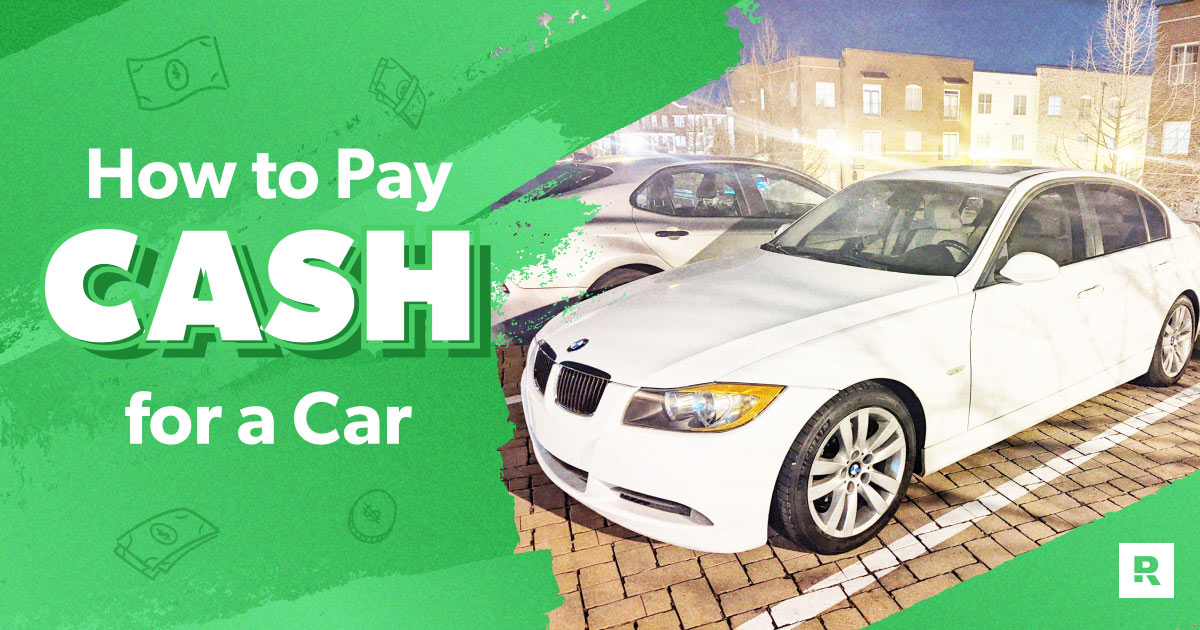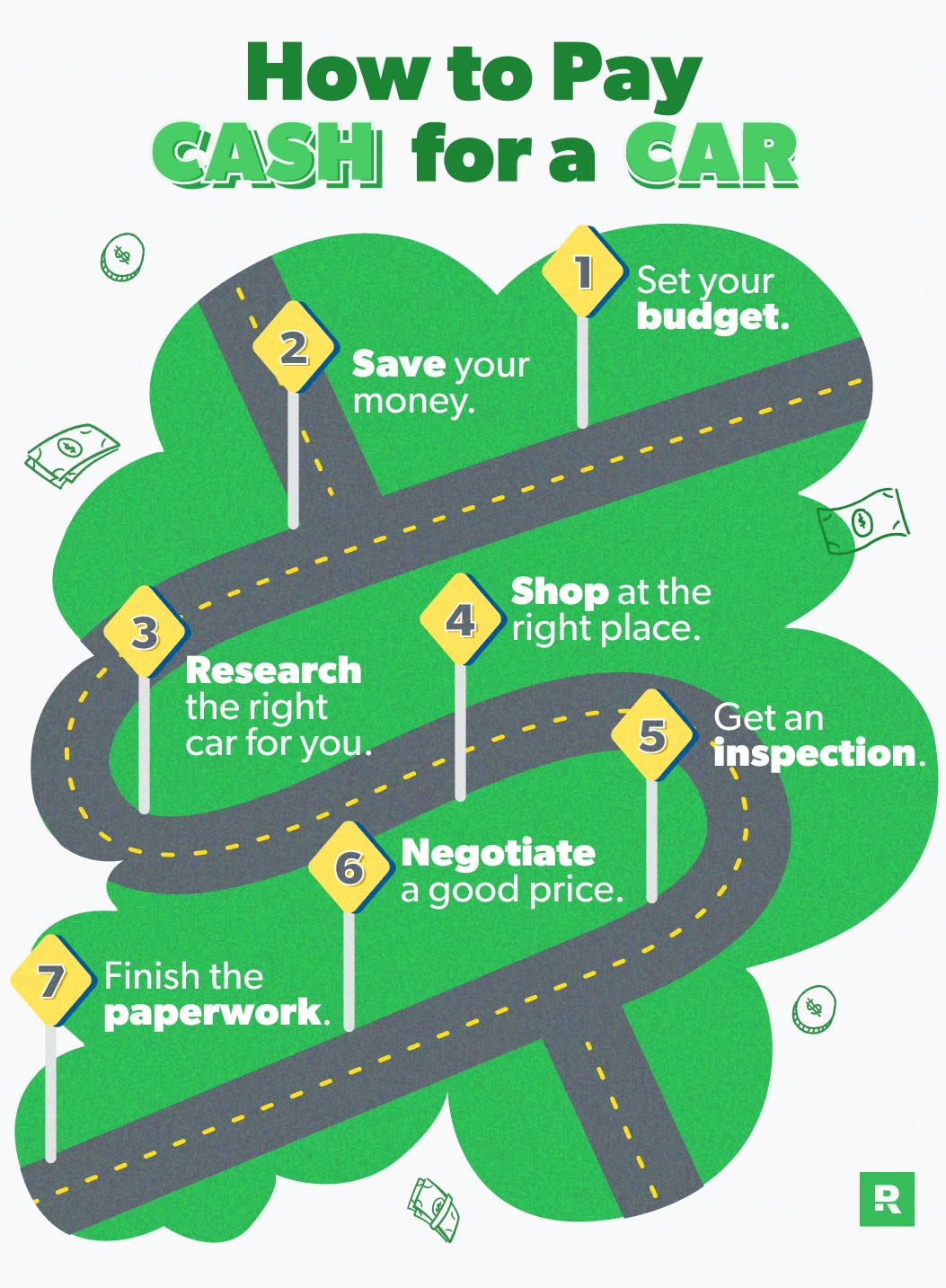So you want to buy some new wheels. Maybe your check engine light is sending a daily warning or you’ve just been itching to upgrade for a while. You’re thinking about paying cash for the car, but you’re wondering how – or if it’s even possible these days.
Good. News. Yes, it is absolutely possible to buy a car unfunded –and it will save you heaps of cash down the road. Let’s find out how.
How to Pay Cash for a Car
Buying a car can be stressful. Pushy sellers. Endless options. upgrade temptations. But listen, if you can keep your head in the game and follow these steps, you’ll end up with a car that pays for itself – without overpaying.
- Set your budget.
- Save your money.
- Research the right car for you.
- Shop in the right place.
- Get an inspection.
- Good price negotiation.
- Finish the paperwork.
1. Set your budget.
If you want to pay cash for a car, you need to know how much car you can really afford! That means making a timeline and deciding that absolutely no one (including yourself) will talk you into something you can’t afford and don’t need.
To get there, ask yourself these questions:
- How much have I already saved?
- How long do I have to save money?
Let’s say you need those newer wheels in about six months, you already have $3,000 saved up, and know you can keep $500 a month in a sinking fund (totaling $3,000 after the six that month): Your budget is $6,000 for a car.
Now run your own numbers so you can set your budget – and decide how much you can afford to pay for your car.
What’s next?
2. Save your money.
Now you get to work. Get your budget and make the changes you need to save the money you need! That can mean cutting spending, starting a side hustle, saying no to extras. . . and it always means staying disciplined.
If you want to make a game out of saving money, try something like the 100 Envelope Challenge. Be intentional, because saving money is one of the most important steps when paying cash for a car!
3. Research the right car for you.
Start doing research on places like Edmunds, Kelley Blue Book and CARFAX. And keep this in mind – the right car for you is one that:
- is in your budget
- takes you where you’re going
- suitable for your lifestyle and season of life needs
- is in your budget
Yes, we said that last one twice. Because it’s that important!
But what about new versus used cars? Here’s our rule of thumb: Unless you have a net worth of at least $1 million, don’t buy a brand new car. A brand new car depreciates by around 9% in value the moment you drive off the lot.1 If you got a $50,000 ride, you would basically be throwing away $4,500 out the window on your way home. Gross. Stick to good quality used cars and let someone else take that hit to their wallet.
There absolutely is nothing wrong with buying a pre-owned car. Don’t let anyone tell you otherwise.
During your research, compare different makes and models, engine sizes and gas mileage. Learn as many facts as you can about the car you want – including prices.
Speaking of which, as you look at prices, you may realize that the budget you set doesn’t match the cars you see. If so, you can do one (or more) of these things:
Any of these options will work. Remember, your main goal is to avoid that car payment and save enough to pay cash for your car.
4. Shop in the right place.
These days, you have a ton of places to buy a used car. To help you get started, we highlight three:
Private Sellers
You can get a great deal when you buy through a private seller. Check out sites like Autotrader, Kelley Blue Book, Craigslist and even Facebook Marketplace if you want to try this method.
Of course there are some risks involved in private seller purchases. One of the best ways to reduce your risk is to take the car to a trusted auto shop and have it inspected – before you buy it. If the seller doesn’t like that, you can always walk away.
Online Car Retailers
Online car retailers are a great option for people who know exactly what they want and don’t like the hassle of searching for the perfect used car. Sites like Carvana and CarMax are great options if you want to be more sure you’re buying quality.
The downside to online car retailers is that there is little room for price negotiation. What you see on the sticker is probably what you get.
Independent Used Car Dealers
If you choose to buy a car through independent used car dealers, do your research. Do they have good reviews? Do you know anyone who has had a successful car buying experience with them? Ask around your community for recommendations.
When you’re ready to shop, remember to arm yourself with knowledge and be brave enough to walk away if a salesperson is too busy.
5. Get an inspection.
OK, we already said this under the private seller section, but let’s be honest: No matter where you decide to shop, you need a car inspection.
Now, a private seller may not be excited to have a stranger drive off in his car before money is exchanged. In that case, you can ask them to take it to your preferred auto shop and have them give you a detailed inspection.
Also, most online retailers already have pretty strict standards for the cars they sell, and you may not be able to get an independent inspection of the car before you buy. Research the retailer’s inspection process and ask enough questions to get the full picture of the car’s history.
Don’t forget to check all the possible secrets of the car before you buy
6. Negotiate a good price.
Now that you’ve found the car (and the inspection checks out), it’s time to make a deal.
You already did your research. You already know your budget — now don’t get excited. remember, you you have the buying power because you’re paying cash for a car, so use these tips to negotiate the best deal on your next car:
- Use your research knowledge. (How does the seller’s price compare to others on the market?)
- Let them know you will be paying in cash.
- Don’t be fooled when they try to upsell you.
- Ask for a deal. (Don’t be afraid to throw out a number.)
- Be quiet. (Less is more.)
- Be prepared to walk away from the deal.
7. Finish the paperwork.
Paperwork is rarely magical. But if you skip this step, you won’t actually own the car.
If you buy from a dealer, all the registration, tags and tax paperwork is done before you walk out with the keys.
But if you buy from a private seller, you’ll have to do the work to register the car, pay taxes, and get your own tags. Be sure to check your state’s motor vehicle agency online to find out how and where to do all of this!
The Benefits of Paying Cash for Your Car
If you’re still thinking, even a little, here are some reasons why buying a car with cash is the way to go:
You will avoid interest.
If you finance a car, rather than paying for it outright, you will overpay. Cause. . . interest.
Let’s look at some national averages to see how much you save when you pay cash for a car:2
| New Car Financed | Used Car Financed | |
| Average Car Loan | $40,184 | $27,167 |
| Average Interest Rate | 7.03% | 11.35% |
| Average Loan Term | About 68 months | About 68 months |
| How Much Would You Pay in Interest | $8,650.06 | $9,790.52 |
| Total Cost | $48,834.06 | $36,957.52 |
Look at those numbers! The average American would save nearly $10,000 in interest if they paid cash for their car. Please!
You’ll avoid that monthly payment.
These days, the average monthly car payment is $726 for new and $533 for used.3 Yuck.
What else could you do with that money in your monthly budget? Pay off debt. Save for holidays. Increase your retirement fund. Get some breathing room to fight inflation. Literally anything apart from throwing it out of the car window every month as the interest payments pile up. Don’t fund. Keep that money for you
You won’t end up owing more than your car is worth.
Depreciation is the difference between the value of your car when you bought it and what you can sell it for now. And as we mentioned before, cars depreciate – or lose value – starting the moment you drive it off a lot. A new car loses 60% of its value in just five years.4 That means if you’re not careful, you can end up going upside down on your car loan – owed more on it than it’s worth. this never happens when you pay cash.
The car is your one.
Ahh, there’s nothing like driving off in a paid-for car for the first time — especially when your name is on the title. Especially when you worked hard to save for it.
When you drive off a lot or out of someone’s driveway in a car you just paid for in cash, it feels different. You will never have a car loan hanging over your head. You won’t have to wonder if your car is worth much less than what you owe on it. You will never have to worry about what happens if you miss a payment. That’s the peace of mind that comes with buying a car in cash!
Why Car Dealers Don’t Want You to Pay Cash
You’ve probably seen conflicting advice on paying cash for a car. Other sites say it’s better to save your money so you have cash for emergencies. Or they will say when you pay to buy a car, you can get a better deal. First, no. Second, no.
And here’s the thing: Car dealers want for you to be sucked into car payments. Why? They do more money on interest when you finance through them. So get ready for their tricks. They will try to convince you that a brand new ride is safer. They’ll say it’s no big deal to blow your budget for some sweet upgrades. Again, no and nape.
Yes, honest and helpful car dealers do exist. But most of the time, their only goal is to make the sale – the best possible sale. For them. And that usually includes financing. But car payments are good for their bottom line –no your benefit.
You It can Paying Cash for a Car
You can – and should – pay cash for a car. Yes, it takes hard work, patience and budgeting. But you’ll save (a lot of) money overall and never worry about accumulating interest or those monthly car payments. Heck. Yes.


